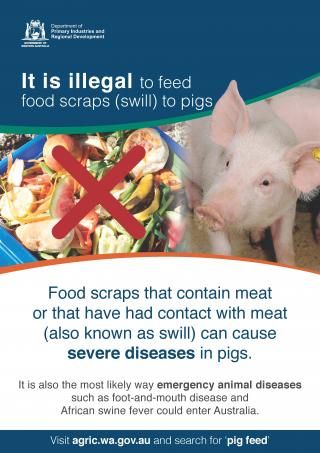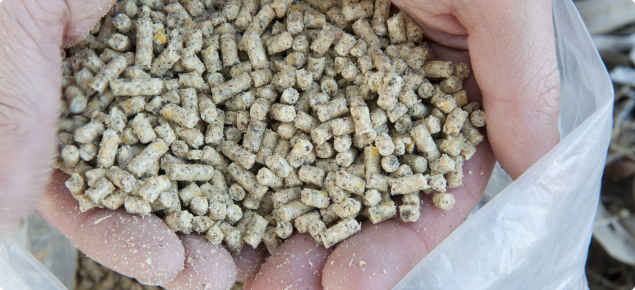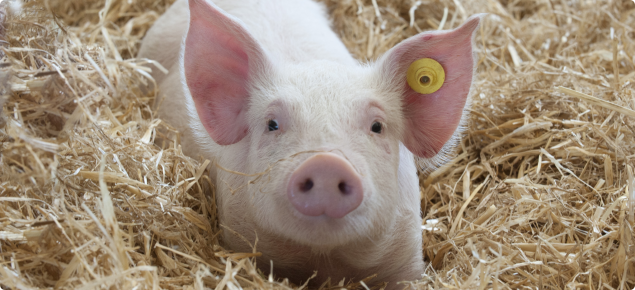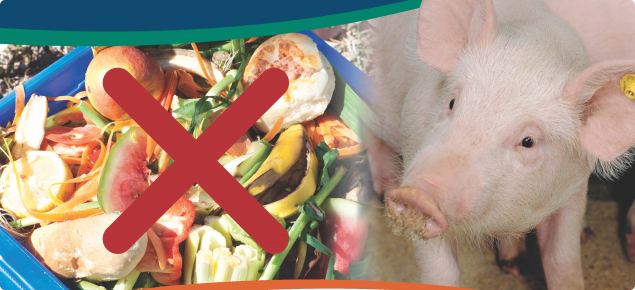Biosecurity alert for pig owners |
|---|
| Foot-and-mouth disease (FMD) is now present in Indonesia and African swine fever (ASF) is established in Asia and parts of Europe. An outbreak of FMD or ASF would have severe consequences for Australia’s animal health, trade and economy and our regional communities.
You can help protect our livestock by keeping FMD and ASF out of Australia. Do not feed meat, meat products or food that has had contact with meat to pigs. Do not allow anyone else to feed your pigs except with safe pig feed (see below).
Always report any unusual deaths in pigs, including feral pigs, and other livestock to your private vet, local Department of Primary Industries and Regional Development (DPIRD) vet or the Emergency Animal Disease Watch hotline on 1800 675 888.
Early detection increases our chances of eradicating FMD and ASF if they do occur. See the FMD and ASF webpages for disease signs and more information. |
What is wrong with feeding food waste or scraps (known as swill or prohibited pig feed) to pigs?
Australia is fortunate to be free of many serious diseases that could affect livestock health and our export trade. The FMD, ASF and other serious viruses that affect livestock can survive for extended periods in meat and meat products. Feeding meat, meat products or products that have been in contact with meat (known as swill or prohibited pig feed) to pigs is the most likely way exotic diseases could be introduced into Australia’s livestock.
Overseas outbreaks caused by swill feeding
- The devastating outbreak of foot-and-mouth disease in the United Kingdom in 2001 is thought to have started when pigs were fed waste containing illegally imported meat products carrying the foot-and-mouth disease virus.
- The recent spread of African swine fever throughout Europe, Russia and parts of Asia is believed to have been caused by pigs accessing food waste.
Australia has strict quarantine and biosecurity measures to prevent the importation of animal products from countries where these diseases are known to occur, but there is still the risk that infected products may reach Australia. This is why it is vital not to feed illegal feeds to pigs.
Which foods are illegal to feed to pigs?
It is illegal to feed pigs any foods that contain meat or have had contact with meat and all products from mammals (except Australian dairy and dairy products legally imported for stockfeed).
Illegal (prohibited) pig feeds include:
- food scraps and wastes from:
- kitchen scraps
- processors and manufacturers
- food retailers including supermarkets and bakeries
- hotels, restaurants, cafés, fast food outlets, delicatessens, lunch bars
- rubbish dumps
- used cooking oil, unless it has been treated to the required standard (see below)
- offal
- mammal blood, bones and carcasses.
If you don’t know whether food has been in contact with meat or meat products, you must not feed it to pigs.
What can I feed my pigs?
Safe feed for pigs includes:
- grains, fruits and vegetables (provided they have not had contact with meat)
- commercially manufactured pig feed/pellets
- foods that have been approved for feeding to pigs in Western Australia. These are:
- Australian milk and milk products from Australia or legally imported into Australia for stockfeed use only
- commercially manufactured meat meals and tallow, provided they have been produced according to the Australian Standard for the Hygienic Rendering of Animal Products (AS 5008:2007)
- used cooking oil, provided it has only been used for cooking in Australia and has been processed according to the National Standard for Recycling of Used Cooking Fats and Oils Intended for Animal Feeds.
Responsibilities of pig owners and food suppliers
- You must not feed prohibited pig feed (swill) to pigs or allow pigs to access it.
- You must dispose of food that contains meat or has been in contact with meat in a way that prevents pigs from accessing it.
- To ensure you don’t accidentally feed your pigs prohibited pig feed or expose them to chemicals or contaminants, you should obtain a vendor declaration from your feed supplier/feed ingredient supplier.
- Businesses that knowingly supply prohibited pig food products for pigs can be prosecuted.
Help protect Australia's pigs and other livestock
To protect Australia's pigs and other livestock, you are asked to report any suspicious feeding practices to your local DPIRD vet or livestock biosecurity officer - see the webpage Animal Biosecurity and Welfare contacts for your nearest office.
When camping or spending time in areas where feral pigs may be present, take all food scraps home so that feral pigs cannot access them. Read more on the webpage: Don't let feral pigs meet with meat.
Also report unusual signs of ill-health or unexplained deaths in your livestock and dead or sick feral pigs to your local vet, DPIRD vet or the Emergency Animal Disease Watch hotline on 1800 675 888.
Penalties
The requirements outlined on this webpage are prescribed in the Biosecurity and Agriculture Management (Agriculture Standards) Regulations 2013. Copies of the regulations are available from the Parliamentary Counsel's Office website.
Under the regulations, people may be prosecuted and fined up to $5000 for:
- feeding prohibited pig feed to pigs
- allowing pigs to access prohibited pig feed
- collecting and storing prohibited pig feed for feeding to pigs
- supplying prohibited pig feed for feeding to pigs.
Posters promoting correct pig feed
You can download factsheets with information about correct pig feed in English, Chinese, Vietnamese and Italian from the Documents link on this webpage.
If you would like print copies of the posters to display or distribute, please email livestockbiosecurity@dpird.wa.gov.au and state the quantity.



